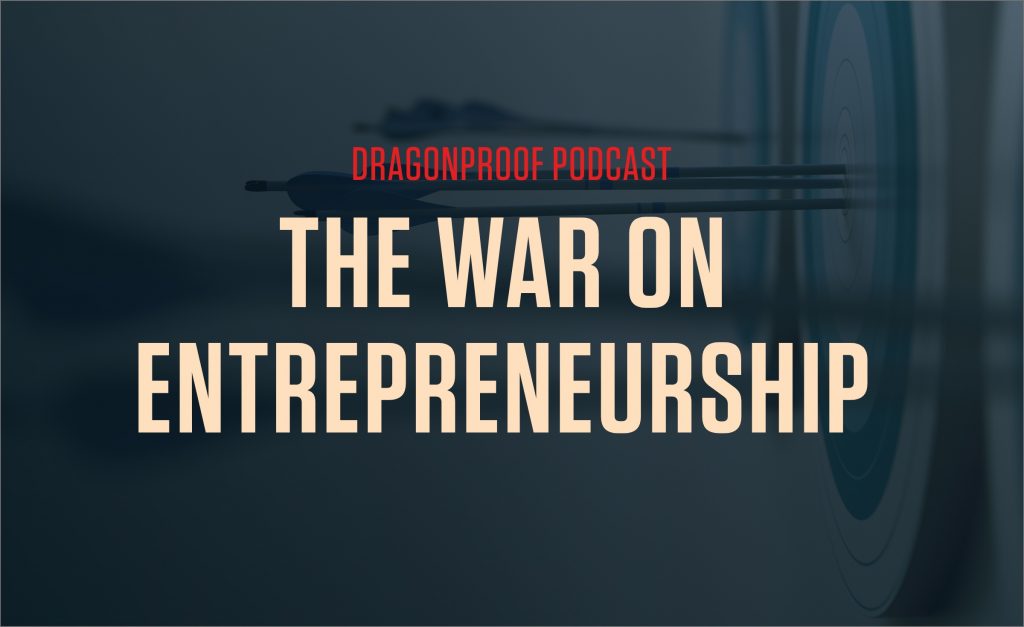By Rick Wilson | August 10, 2021

See why top ecommerce brands use Miva’s no-code platform to run
multiple stores, manage massive catalogs, and grow their revenue.
In 2019, Miva CEO Rick Wilson wrote “Dragonproof,” a book which broke down the core factors which drive successful ecommerce. At the time, the greatest opponent independent sellers faced was Amazon. The challenges all businesses dealt with over the past year and a half have not diminished Amazon’s threat to small businesses, but added to it. On the new Dragonproof Podcast, Rick argues that the industry is threatened by a “war on entrepreneurship,” the subject of an all-new book Rick will debut this fall.
The main takeaway from 2020 was that sellers had to embrace full digitization in order to stay competitive in a retail economy shifting more towards ecommerce by the day. However, once those businesses enter the modern, highly interconnected digital economy, they immediately face an ocean of new threats, any one of which might destroy a business model or convince a seller to close shop.
The anti-competitive business practices of “big tech” have been well documented, most recently by Presidential executive order. For ecommerce sellers, major marketplaces and retail giants have been the prime offenders, with the need to sell via Amazon or Walmart a given for most businesses, in order to remain viable. High fees, strict controls on content, and product poaching are some of the perils for indies in these environments.
At the other end of the spectrum, the pop culture trend of marketing products via pseudo-commercial social media influencers also undermines bona fide ecommerce sellers. “That's not representative of what being an entrepreneur is,” Rick says. The goals and tactics of an Instagram post are radically different from those of an SMB moving products through complex supply chains to nationwide customers, but for new generations, the two are conflated. This creates unrealistic expectations for businesses and shoppers. While some sellers are able to excel in these environments, many end up losing the distinction between the drive for likes and sustainable revenue.
Of course, anti-trust cases and internet trends pale in comparison to the threats posed by unpredictable force majeure events like the Covid crisis. While Covid’s economic impact ultimately emerged as a net positive for ecommerce, many U.S. retailers were leveled by the pandemic. Without adequate protection from government, insurers, or a “dragonproof” business model, a smaller business has to fear getting wiped out the next time the supply chain breaks for any reason at all.
All of these threats add to the war-like atmosphere which new entrepreneurs find themselves in this year.
“Imagine you're a young person dreaming of your future,” Rick asks, “wondering what you want to be when you grow up. If you want to be an entrepreneur, what does that even look like today? Well, there is nothing the world needs more than principled entrepreneurs.”
The most successful tech and ecommerce companies take great pains to articulate operating principles which are meant to define the importance of a brand mission, and protect it from the types of encroachment listed above. Google has famously laid out 8 “innovation principles” which reinforce the company’s aspirational reasons for being, but this is a concept which is vital for businesses at every scale.
Operating principles which demonstrate strong commitment to quality, customer, and culture can differentiate a brand from its monopolistic competitors, give consumers a reason to trust the brand over influencer spon-con, and even shield companies from some of the damage of global events like Covid. By insisting on (and publicizing) high quality, principle-driven business practices, companies can demonstrate value to society, and will enjoy the protection of that society when conditions are difficult. For example, recipients of federal business stimulus and loans in 2020 were expanded to include businesses which provided cultural value.
“If you can build a good business with solid principles and a good product,” Rick says, “people will voluntarily come back to you time and time again to spend their hard-earned money, thus giving your employees a pathway to their own prosperity. Creating a virtuous cycle like that should be celebrated.”
One of the key themes of Rick’s book “Dragonproof” is that “dragons create opportunity.” Dragons in a larger sense refer to anything with over-sized command of a market—this could mean Amazon, a social trend, or even a pandemic. As powerless as these forces may make entrepreneurs feel, Rick points out that it’s important to see the practical openings which “dragons” create.
Companies like Apple are so massive that certain niche innovations just aren’t worth the trouble to develop, even if those niches support Apple’s own products. For example, iPhone cases contribute nicely to Apple’s accessory revenue, but in no way justify the massive level of investment of the phone itself. That leaves an opening for a company like Otterbox, or an indie seller on Etsy, to pounce. As Rick explains, sellers across the spectrum can use the same approach.
“You want to think about opportunities where there is a huge fertile ground that's been left there because a dragon needed to clear that ground. And what grows in its place is opportunity for you.”
Ultimately, entrepreneurs can assert the importance of their businesses by demonstrating value to society and customer, maintaining situational awareness of threats, and looking for strategic opportunities left in the wake of those same threats. Those are proven methods for enduring entrepreneurial success.
“Businesses done right,” Rick says, “…the ones which last, are the backbone of a very bright future.”
To listen to Rick’s full thoughts about the challenges facing entrepreneurs in 2021, stream the new Dragonproof Podcast here.
Back to topNo worries, download the PDF version now and enjoy your reading later...
Download PDF Rick Wilson
Rick Wilson
With over 20 years of executive-level experience, Rick has a unique vantage point on the business shift to ecommerce. He asserts that business society is still very early in the transition to ecommerce, with only about 6% of retail and even less of B2B transactions currently conducted in online commerce.
Visit Website